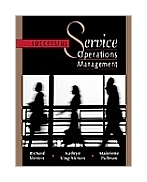|
||
• wydawnictwa polskie
• Zamów informacje o nowościach z wybranego tematu • kontakt
• Cookies na stronie |
SUCCESSFUL SERVICE OPERATIONS MANAGEMENTMETTERS R., KING-METTERS K., PULLMAN Mwydawnictwo: THOMSON , rok wydania 2003, wydanie Icena netto: This book covers the full cycle of building a service business from concept formation through implementation. The first section of the book - three chapters - focuses on constructing a business strategy. The next section details how to implement that strategy in the design of the service system. Capacity management is an important strategic and tactical issue in many services, and is the subject of the four chapters in the third section of the book. Finally, the last four chapters provide managers tools for everyday operation. For the last eight years, Professor Metters has been on the faculty of Emory University, Vanderbilt University and Southern Methodist University. Prior to his academic career, he worked for Crocker Bank, Bank of America, and Citicorp. He has published 20 articles in journals such as Journal of Operations Management, Management Science, and Harvard Business Review, and is on the editorial board of three journals: Journal of Service Research, Journal of Operations Management, and Production and Operations Management. His main research interest is operations management in the service sector.Professor Metters has taught "Service Operations", "Service Operations Models", and "Service Operations for Consultants", as well as "Management Science in Spreadsheets" and the required operations core course. Kathryn King-Metters is a Management Consultant. She holds an MBA from the Kenan-Flagler Business School, University of North Carolina, an MA from The Ohio State University, and a BS from East Stroudsburg University. Her graduate work focused on services operations and international strategic operations. She has taught in public schools and at the university level at the Kenan-Flagler Business School at the University of North Carolina and in the Business School at Meredith College in Raleigh, NC.In addition to holding a variety of marketing, sales, forecasting, and customer service management positions at IBM, SAS Institute, and Berol Corporation, she founded and managed her own management consulting company for five years in Raleigh, NC. Since that time she has consulted with Arthur Anderson, Scott, Madden & Associates, and J. D. Power & Associates. Her particular consulting interests are services operations, strategic analysis, strategic and operational planning, and customer service satisfaction. She has served in a variety of professional positions including Chapter President and Officer with the International Customer Service Association and Chapter President and committee chair with the American Marketing Association. She has been an invited conference speaker for many events including the 1994 International Customer Service Association International Conference. Her nonprofessional activities have included volunteer work for numerous charitable groups including the United Way, American Heart Association, Girl Scouts of America, Executive Service Corps, Council for Entrepreneurial Development, Phoenix Academy, Tennessee State Art Museum and Botanical Gardens, and The Dallas Arboretum. She has particular interests in the areas of children's issues and the environment. Madeline Pullman is an Assistant Professor at the College of Business at Colorado State University. She has also taught at London Business School and Southern Methodist University. She has a Ph.D. in business, M.B.A., and an M.S. in Mechanical Engineering from the University of Utah, and a B.S. in Energy Systems from Evergreen State College. She has published case studies and articles in Journal of Operations Management, Decision Sciences, Production and Operations Management, International Journal of Service Industry Management, and many other journals. Her interests in service operations include teaching a course in the entertainment industry, as well as traditional service operations courses. Benefits: Case studies: These add both a real context to the material as well as a "decision orientation" to keep students interested since they immediately see how the content can be used to make decisions; Cutting Edge Coverage of Topics: This book introduces coverage and topics not always seen in other texts. Examples include Internet strategies, environmental strategies, creating customer experiences, back-office design, and scoring systems; Boxed Features: These provide real-life examples of theoretical concepts so students see concepts used in practice. Each chapter has at least one boxed feature. 464 pages Księgarnia nie działa. Nie odpowiadamy na pytania i nie realizujemy zamówien. Do odwolania !. |


